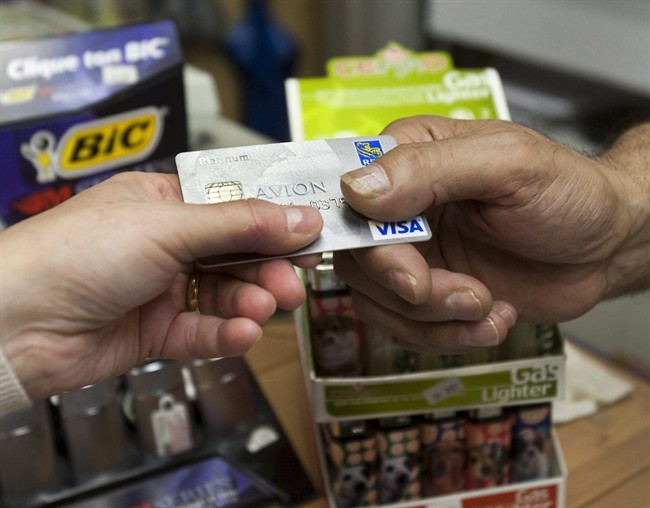Canadians could soon be hit at the cash register with credit card surcharges of as much as 10 per cent of the cost of their purchases, the Consumers’ Association of Canada warned Tuesday.

The association says that could be the outcome of a pending ruling from Canada’s competition tribunal, which is judging a case against Visa and MasterCard that was launched in 2010.
“It’ll be like striking the marketplace with lighting. It’ll disrupt the whole way that we pay for our goods,” said association president Bruce Cran of Vancouver. “Nobody knows about it but you could wake up one morning — next week this thing might be out — and you could be paying, all of a sudden, a 10-per-cent surcharge on some things. So it’s going to be a big shock.”
The consumer group is siding with Visa and MasterCard, companies targeted in 2010 by tough-talking competition watchdog Melanie Aitken, who left her post as head of the federal Competition Bureau last year.
The bureau, backed by the Canadian Federation of Independent Business (CFIB) and the Retail Council of Canada, argues that merchants should be able to pass on credit card charges — typically anywhere from two to three per cent of the purchase — directly to consumers.
Retailers argue that the estimated $5-$6 billion a year in charges that retailers pay to credit card companies — primarily Visa and MasterCard — are “costs of doing business” that are already passed on to shoppers.
The bureau is challenging rules imposed by the credit card companies that prevent retailers from refusing to accept “premium” credit cards that offer reward miles, points and other benefits for consumers, but require higher processing fees to be paid by the merchants to the credit card firms.

Get weekly money news
Another rule prevents merchants from passing on costs of credit cards, and especially the premium cards, as a way of encouraging them to use cash or debit cards, which cost merchants a fraction of the cost of credit cards.
Hearings on the matter wrapped up last year, but an official at the Competition Tribunal wouldn’t say Tuesday when the decision will be made public. The report is “still at the drafting stage” and has not yet been submitted for translation into French.
A Competition Bureau lawyer argued before the tribunal last year that the current situation is like a “reverse Robin Hood.”
The $5-$6 billion in costs is passed on to all consumers, including those who use cash or debit cards. The wealthy, argued Kent Thomson, are more likely to use the premium cards.
“The least affluent consumers subsidize the purchases of the most affluent consumers,” Thomson said.
CFIB president Dan Kelly, writing in the National Post Tuesday, also argued that the “opaque” credit card rules result in merchants and consumers paying needless extra charges that are steadily rising.
He argued that a tribunal decision in favour of the Competition Bureau’s position wouldn’t lead to a free-for-all of new consumer fees, though he acknowledged there may be a need for rules to make sure charges don’t exceed the cost of fees paid to credit card companies.
“Small businesses are unlikely to impose fees on consumers very often. Nor are they likely to refuse a premium card from a customer,” Kelly argued. “Merchants — particularly small ones — do not have the market clout and would not want to risk losing the customer to the shop down the street.”
But he said the power to impose a surcharge or refuse a high-cost card will act as an incentive for banks and credit card companies to keep their fees low.
Cran said there’s no evidence that merchants, if they are able to cover the cost of credit card charges with new fees to consumers, will pass on those savings through lower prices for their goods and services. He said Canada should look at Australia’s experience after surcharges were allowed in 2003.
While rules have been recently tightened, a company called Cabcharge — which has developed a credit card designed for the taxi industry — is still imposing a 10-per-cent surcharge.
He said in some instances Australian merchants have charged a flat minimum fee which, in the case of a purchase of a small item like a coffee, could mean a charge approaching 100 per cent.
“In Australia it’s become a huge profit centre for them, as opposed to just recovering the cost.”
Cran rejected the argument that consumers, if faced with lofty credit card surcharges, could simply shift massively to the use of their debit cards or cash. At last year’s tribunal hearing, Thomson said the debit card fee on a $200 purchase would be about 15 cents — whereas the credit card cost would be up to $6.
The reason? Loyalty reward programs.
“People love their points,” Cran said.







Comments